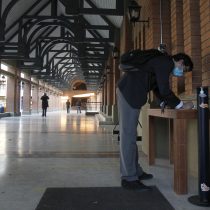
As a result of the pandemic, school communities have seen a multiplication of educational needs in their students, the result of a lack of accessibility to the educational process, the deepening of poverty and the consequent absence of contexts conducive to learning. In this context, the support of school integration programme (PIE) professionals is of vital importance, in order to contribute to the design of educational responses tailored to the diversity of educational needs that are already being addressed and against which it will be necessary to respond effectively and forcefully once the return to school is regularized , if possible – in 2021.
PIE teams, which include differential teachers and education assistants, support not only those who present a clinical diagnosis, but for all students in the classroom, providing support in socio-emotional and pedagogical aspects, and collaborating with regular teachers and management teams to ensure the right to education for all.
In the face of this reality, it is to be expected that the Ministry of Education will resolve to maintain and, if necessary, increase the staffing of PIE professionals by next year. From an inclusive and rights approach, it would be advisable to suspend the comprehensive formal evaluation process associated with the PIE grant in all educational establishments in the country, regardless of the stage in which the communes are located. This, since there are no conditions that ensure its correct implementation, both from a health point of view and because of the unusual situation in which the girls, children and adolescents, their families and the same professionals find themselves, which can obviously affect the evaluative experience and its results. In addition, teams should not neglect the support function they are doing today.
In the current situation, it is most reasonable to maintain the budget allocated in 2020 to each establishment and increase it against justified requests, not necessarily associated with clinical diagnoses, as special educational needs may or may not be associated with them. In fact, many educational needs, present in Chilean classrooms, are linked to conditions of affective, social and economic vulnerability or to the precarious life situations of migrant children, among other realities.
The content poured into this opinion column is the sole responsibility of its author, and does not necessarily reflect the editorial line or position of El Mostrador.
"El reclamo puede ser genuino, pero construido sobre una mentira", apuntó el presidente Javier Milei…
El gobernador de la provincia de Buenos Aires, Axel Kicillof, encabezó un acto en Ensenada…
El diputado nacional de La Libertad Avanza, José Luis Espert, expresó su confianza en la…
Tras la masiva reaparición de Cristina Fernández de Kirchner, el presidente Javier Milei apuntó contra…
El principal propósito de la nueva comisión es evaluar los recursos humanos en el Senado,…
En una medida que busca redefinir las condiciones de los seguros de automóviles en Argentina,…
Esta web usa cookies.